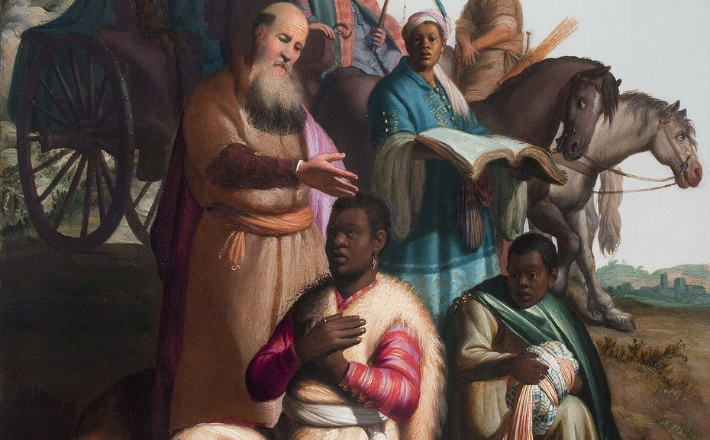Commentary on Acts 8:26-39
When we walk down wilderness roads, we encounter strangely fabulous, frighteningly diverse, and uncomfortably wonderful people. Philip was called on his faith journey to walk a wilderness road and to be in relationship with someone whose very person was unfathomable to him. With the help of the Spirit, he encountered a person of rich faith.
In this pericope we hear a story that is perhaps familiar for some, the story of Philip and the Ethiopian eunuch. Earlier in chapter 8, Philip has fled from the violence against Christ-followers that has arisen in Jerusalem. In order to continue his ministry, he goes to Samaria to preach and heal (8:4–8). The appointed text for this Sunday begins in Samaria, where Philip encounters a divine messenger who tells Philip to walk from Jerusalem to Gaza, along a desolate (erēmos) road (8:26).
Although the New Revised Standard Version describes the road as a “wilderness road,” the point in the Greek is to paint a picture of a solitary, lonely, destitute place. Acts emphasizes this in contrast to the crowds and communities that surrounded Philip while he was in Samaria. Philip had been at the center of this new post-resurrection world, completely immersed in the community of Jesus-followers and the earliest organization of the church.
Along this road, bereft of community, Philip meets what must have been an entourage. The leader of this entourage is from the royal court of the Kandake of Ethiopia, the queen of one of the most powerful nations in Africa. Acts says that the man (anēr) was a eunuch (eunouchos). In the ancient world, boys and men were sometimes deliberately castrated so they could be “harmless” guards for powerful women or groups of women.
While Acts uses this person’s sexual status as the main identifier, preachers might consider using the person’s name. Few listeners would want their sexual status to become their de facto name. Even ancient commentators felt the need for a personal name. Tradition in the second century CE names him Simeon Bachus. Some Orthodox traditions name him Djan Darada. More closely aligned with the Hebrew language he was reading, Wil Gafney names him Abdimalkah.1 I will call him Abdimalkah as we continue our exploration.
Indeed, Abdimalkah is much more than his sexual status. Acts notes that he oversees the queen’s “entire treasure” (pasa gaza; 8:27). There is a pun here in the Greek between the city, Gaza, and the queen’s treasure. Both, readers should understand, are rich and powerful and opulent. Both are of significant consequence in Roman imperial geopolitics.
The Spirit nudges Philip to approach the chariot where the treasurer is reading part of the suffering servant from Isaiah 53:7–8. Reading in the ancient world is something that most people did out loud, so as Philip approaches, he likely hears Abdimalkah reading aloud the words in verses 32–33. He asks—perhaps paternalistically, perhaps because he hears these words in accented language—if Abdimalkah would like to talk about what he is reading. As they read the text together, it is striking that Philip waits for Abdimalkah’s question rather than offering unsolicited instruction.
Philip connects the violence in the Isaiah passage about the suffering servant with Jesus and recent events in Jerusalem (8:30–35). The conversation turns to contemporary events rather than historical figures—Isaiah is not inherently Christocentric. Perhaps preachers might make the same move. Who are the suffering servants faced with violence in our world? How might we respond?
As the conversation continues, Abdimalkah sees water and asks what is to prevent his baptism (8:36). In verse 38, readers hear no objection, no conditions, and no questions about Abdimalkah’s faith. Philip simply baptizes him, and the Spirit immediately takes Philip off to his next assignment.
What Acts leaves out from this story is as telling as what is included. Close readers (both preachers and listeners) will notice that most contemporary translations are missing a verse 37. This verse does not exist in some of the oldest and most reliable manuscripts of the Greek text.2 Some later manuscripts include a verse that reads, “Philip said, ‘If you trust (pisteuō) with all your heart, you may.’ The eunuch answered, ‘I trust (pisteuō) that Jesus Christ is the Son of God.’” By translating the word pisteuō as “trust,” preachers capture a sense of embodied mystery that is not present when we translate the verb with “believe.” The only action demanded in baptism in verse 37 is trust. Abdimalkah is not using his intellect to assent. He is not feeling repentant or contrite. He is trust-falling into the mystery of the crucified and risen Christ.
In baptism we need only trust Jesus Christ, God’s Son. Philip does not require Abdimalkah to abdicate his position, to change his life habits, or to leave his nationality (race, ethnicity, et cetera) behind. The Spirit does not need Abdimalkah to prove anything about himself before, during, or after baptism.3
In the moment of baptism, Abdimalkah’s anatomy or sexuality or gender status is simply part of who he is as a baptized child of God. Even though Acts continues to identify him with his sexual status (“the eunuch”), not once does Philip question whether this identity is proper or fitting for inclusion in Jesus’ movement. Philip does not try to convince Abdimalkah to renounce who he is, or shame him for his sexual status. Philip asks no questions about whom Abdimalkah loves or how he lives. Philip’s invitation to baptism comes with no conditions around his life choices or existential being. In fact, Abdimalkah’s question about what is to prevent baptism in a wilderness oasis is not answered with a question about whether the eunuch will change his life. The simple, mysterious action of baptism satisfies the Spirit, and both Philip and Abdimalkah find an oasis along a desolate wilderness road.
Notes
- Abdimalkah means “Servant of the Queen,” a title that honors his connection to the Kandake. Wil Gafney, “Black, Jewish and Queer: The Ethiopian Eunuch,” Womanists Wading in the Word, May 4, 2012, https://www.wilgafney.com/2012/05/04/black-jewish-and-queer-the-ethiopian-eunuch/.
- Beverly Roberts Gaventa, Acts, Abingdon New Testament Commentaries (bington, 2003), 144.
- Conversation with Rev. Sara Spohr, lead pastor, Lake Nokomis Lutheran Church, Minneapolis, MN.
- PRAYER OF THE DAY
Fulfillment of the prophesies,
With Scripture and water you claim people as your own. Claim us with water and the word, so that we may rejoice in the life given to us through the gift of the Holy Spirit, for the sake of the one whose spirit lives in us, Jesus Christ. Amen.
HYMNS
All who believe and are baptized ELW 442, H82 298
O blessed spring ELW 447
On our way rejoicing ELW 537
CHORAL
There is a river, Ellen Gilson Voth


May 11, 2025